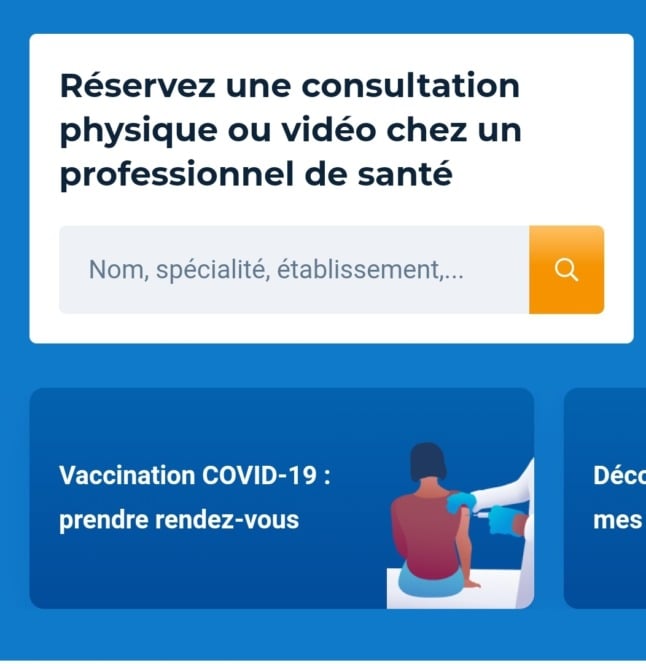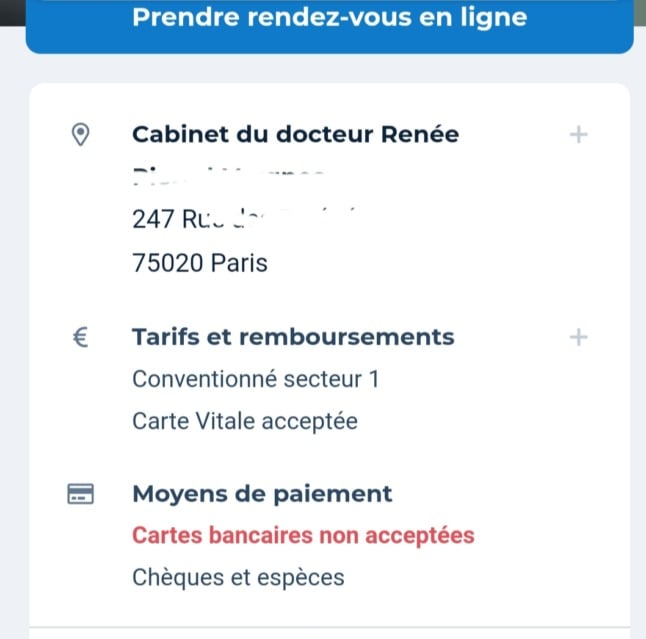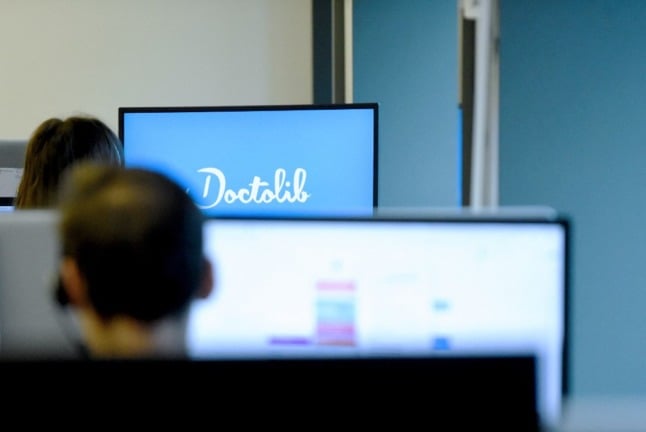But, for all its faults, there’s no doubt the 21st century is a digital marvel. And France is one of the countries that benefits from an online portal designed to make arranging a visit to your doctor, dentist or other medical specialist easy.
If there happens to be a pandemic on, you can also arrange tests and vaccinations here.
What is it?
Doctolib is both a website and a phone app for booking medical appointments, with a host of handy features. There’s really only one drawback to it – it isn’t available in English.
There are several online medical platforms in France: Keldoc, Allodocteur, Docavenue, Consulib are some examples, but Doctolib is most widely used – it has 140,000 healthcare professionals registered.
Why use it?
If you shrivel with fear at the thought of a phone conversation in French with a doctor’s receptionist, then this is a handy alternative, but there is more to Doctolib than that.
In France although you have a registered médecine traitant (GP or family doctor), you can see any doctor you want to. And if you want or need a specialist, then it’s up to you to find one.
But how do you know how to find a gynaecologist/dermatologist/orthodontist near you? That’s where Doctolib comes in – you enter your location and search for speciality you need and the site shows you a list of that type of medic near you, you can then click on each profile to find out more about them.

As well as listing the particular specialisms of each medic, Doctolib also includes a section that is particularly handy for foreigners in France – langues parlées (languages spoken) so that if you need an English-speaker you can find one.
And if something that is (hopefully) out of the ordinary like a national vaccination campaign or a need for regular testing comes up, then nearest available appointments are listed on Doctolib.
You can find Covid vaccinations or tests by searching ‘vaccination Covid-19‘ or ‘dépistage Covid-19 test PCR‘ or ‘dépistage Covid-19 test antigenique‘.
How to use it
The first thing you need to do is register.
Before you can book an appointment you need to create an online account. Click HERE and scroll down to Nouveau sur Doctolib (New to Doctolib) and select s’inscrire (register).
You need to supply a phone number, email address, and date of birth – and come up with a secure password.
Alternatively install the Doctolib app on any smartphone and go through the registration process.
Booking an appointment
Once you have an account, you can log-on at any time using your email and password.
If you have a registered GP or family doctor, you can add them to your profile and then book appointments as needed with a couple of clicks.
Some doctors list only their contact details so you have to call them up, but most have the option to ‘prendre rendez-vous en ligne‘ – click on this and it will give you a list of the available appointments for that medic, so you can book a time slot that suits you.
If you’re searching for a specialist, head to the search box at the top ‘Réservez une consultation physique ou video chez un professionnel de santé’ (make an in-person or online appointment with a health professional) and enter the type of appointment you want into the search bar.
If you just want an appointment with a GP or family doctor, search médecin généraliste.
Dentists/nurses/physio
Despite the name, it’s not just doctors, you can find dentists, nurses, midwives and specialists such as physiotherapists (kinésithérapeute).
Specialists
Unlike in the UK where you generally need a referral to see a specialist, in France you can choose to see any specialist. Even if your GP considers that you need to see a particular specialist, it’s often up to you to book the appointment.
Likewise if you’re contacted as part of a national health screening programme such as cervical smears/pap smears you will usually just be told to ‘book an appointment with a GP, midwife or gynaecologist of your choice’.
You can search by specialism on Doctolib, and then click on a profile to find about more about them and the type of services they offer to make sure that you’re getting the right person.
Then click prendre rendez-vous and select a time slot.
The website will then ask you to choisissez un motif (select your reason), so here you select the option from the drop-down menu that is most compatible with your reason for making an appointment (or if you’re not sure just select autre – other).
Other features
Languages – As mentioned above, if you need an English-speaking medic you can click on a doctor’s profile and scroll down to find langues parlée.
Friends and family – you can also book appointments for others on Doctolib. This is most widely used by families, but during the pandemic it has come in handy to allow French residents to book Covid tests for friends or family members who are visiting them.
When asked whether the appointment is for you or ‘un proche’ (a loved-one) click un proche and then fill in their details. You don’t need to be married or related to use this.
Uploading documents – If you need to show any supporting documents – a GP referral note, blood test results or X-rays, for example – you can upload these in advance via Doctolib. This also helps speed up the appointment if your French is not so great.
Once you have booked your appointment you will see an option to partager des documents (share documents). You upload these here and a photo taken on your phone of the doctor’s letter/test results etc is perfectly adequate.
Online appointments – virtual consultations (télémedecine) have become increasingly popular during the pandemic, and are available via Doctolib.
Not all doctors offer them, but if yours does then you just need to tick en vidéo to ensure that your consultation is online and not au cabinet (in person).
How these are hosted varies, but many doctors use Doctolib’s video consultations service, so you just need to log in to your account on the appointment day.
Reminders – Doctolib will send you both an email confirmation and reminders nearer the time to ensure that you don’t forget your appointment.
Payment – The app also lets you know in advance whether your doctor accepts bank cards or whether you will need to take cash along to the appointment.

It also lists whether the health professional accepts carte vitale (ie whether you can get part or all of the cost of your consultation refunded) and whether they are secteur 1 (charging the standard fee such as €25 for a GP consultation) or secteur 2 (more expensive than the government-set fees).
READ ALSO What you carte vitale entitled you to
Offline – be aware that Doctolib is a private booking platform, not a government medical registry, so not all doctors are on it.
If you can’t find the type of health professional that you need in your area on Doctolib, it doesn’t mean that they don’t exist, you might just not be registered. In that case it’s back to the old-fashioned method of asking friends or neighbours or going out searching.



 Please whitelist us to continue reading.
Please whitelist us to continue reading.
If you use Google Chrome, you can translate most of Doctolib automatically, which I have found to be extremely valuable.
I have used Doctolib for a good few years now and it’s perfect for what I need. Highly recommend.